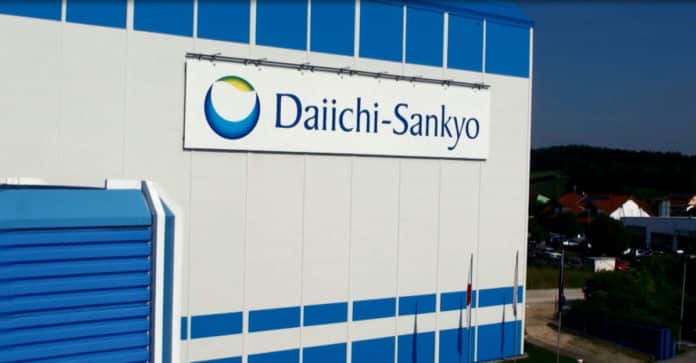AstraZeneca – Daiichi $6.9B Pact To Co-develop Cancer ADC
AstraZeneca will enter a pcct worth $6.9 billion to co-develop Daiichi Sankyo’s Trastuzumab deruxtecan–just months prior to the initial application to market the cancer-fighting antibody-drug conjugate (ADC) is defined to be submitted to the FDA.
Daiichi Sankyo is developing trastuzumab deruxtecan, also called DS-8201, for individuals with multiple HER2-expressing cancers – including breast and gastric cancer, as well as in non-small cell lung and colorectal cancer. Trastuzumab deruxtecan is the topic of five pivotal trials in HER2-expressing breast and breast cancers.
Under the deal, both pharma company will together develop and sell the drug, should it get approved, as both a monotherapy or as part of a mix, except in Japan where Daiichi hangs on to exclusive rights. It’s also solely responsible for the manufacturing and supply of the treatment.
AstraZeneca and Daiichi Sankyo stated they intend to accelerate and expand development of trastuzumab deruxtecan across the breast and other cancers, a justification the ADC has the potential to redefine the standard of attention.
Analysts at Jefferies stated in a note to clients this morning that- they see the strategic rationale for AstraZeneca to bolt-on trastuzumab deruxtecan to its key oncology portfolio
, possibly offering a contribution from 2020E with upside optionality from future wider indications.With an FDA breakthrough label and fast track tag for several cancer goals, this drug is made up of Roche’s Herceptin HER2-targeted antibody and a topoisomerase I inhibitor payload.
Letanalyzeyse how this drug has performed till date – In phase 1 in patients with HER2+ breast cancer who had been treated with Roche’s next-gen breast cancer medication Kadcyla, HER2+ gastric cancer post-Herceptin, and other HER2+ expressing solid tumors, Daiichi/AZ’s drug saw an overall response rate (ORR) of 50.6percent (81/160) with the maximum ORR in HER2+ breast cancer (64.2percent ) and slightly less response in HER2 low expressing breast cancer (59.4percent ). The median duration of response was not reached.
Grade 3 or higher adverse events were experienced by 46 percent of patients (93/200) and 2 cases of grade 5 interstitial lung diseases were reported. The drug is currently in a series of trials across several cancers across all three phases of clinical development.
By means of a linker attached to a monoclonal antib,ody the ADCs are designed to deliver chemo payloads to cancer cells, which binds to a specific target on cancer cells.
The ADC area has been a mixed bag in terms of results to date. This week, Astellas and Seattle Genetics are prepping to file for FDA approval of their drug enfortumab on the strength of stage 2 data. This trial data from that was posted this week which is linked to the antibody-drug conjugate to a 44% response rate in patients with locally advanced or metastatic urothelial cancer.
The pair is considering controlling the emerging post-immune checkpoint inhibitor space–as is Immunomedics and its ADC, IMMU-132. Being knocked back by the FDA in triple-negative breast cancer this ADC has suffered a rocky path, it is still advancing in metastatic urothelial cancer.
This will bring R&D changes for both companies in recent times: Daiichi has shuttered a 170-person Indian R&D site and back in 2017 turned into the ax on R&D staffers in its native Japan, culling its research subsidiary called Asubio Pharma.
The unit had around 150 workers that worked on psychiatric and neurological diseases, inflammatory and immune diseases, and regenerative medicine, a few of which were said to be moved across the company’s other R&D units around the globe.
Japan and India joined R&D units in the U.K. and Germany on the record of those axed by Daiichi over the past few years.
But whilst sharpening the ax of several R&D websites, Daiichi has also been sharpening its pen, signing a series of oncology deals designed to provide the company with a pipeline of candidates who can boost success rates in the clinic.
One of the more high-profile of these agreements is the deal with Kite Pharma which is now part of Gilead giving Daiichi the rights to CAR-T drug Yescarta (KTE-C19) in Japan, as well as its doubling back on I-O work with Zymeworks.
This year it also looked to double back on its research units with movement up the top: Junichi Koga, Ph.D., recently became the organization’s new global head of R&D, taking over from Glenn Gormley, M.D., Ph.D., who had served as senior executive officer of the Daiichi Sankyo Company in addition to president and CEO of Daiichi’s U.S. division.
Gormley has, in fact, stepped down from each of these positions but stays on as chair of Daiichi as well as a special adviser to its international CEO John Nakayama on R&D matters.
Meanwhile, AstraZeneca has also recently changed things up with its R&D unit: Following an exodus of executives within the last year or so, the British-based pharma hired controversial scientist José Baselga to conduct its newly formed cancer-focused unit, where the new ADC development will sit.
At the exact same time, Mene Pangalos, who was formerly responsible for the provider’s Innovative Medicines and Early Development Biotech Unit, took the helm at another brand new unit, the Research and Development unit for BioPharmaceuticals, which focuses on research for CV, renal and cardiovascular and metabolic –i.e., most of its work out cancer.






























